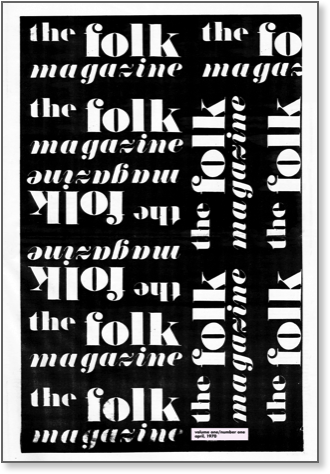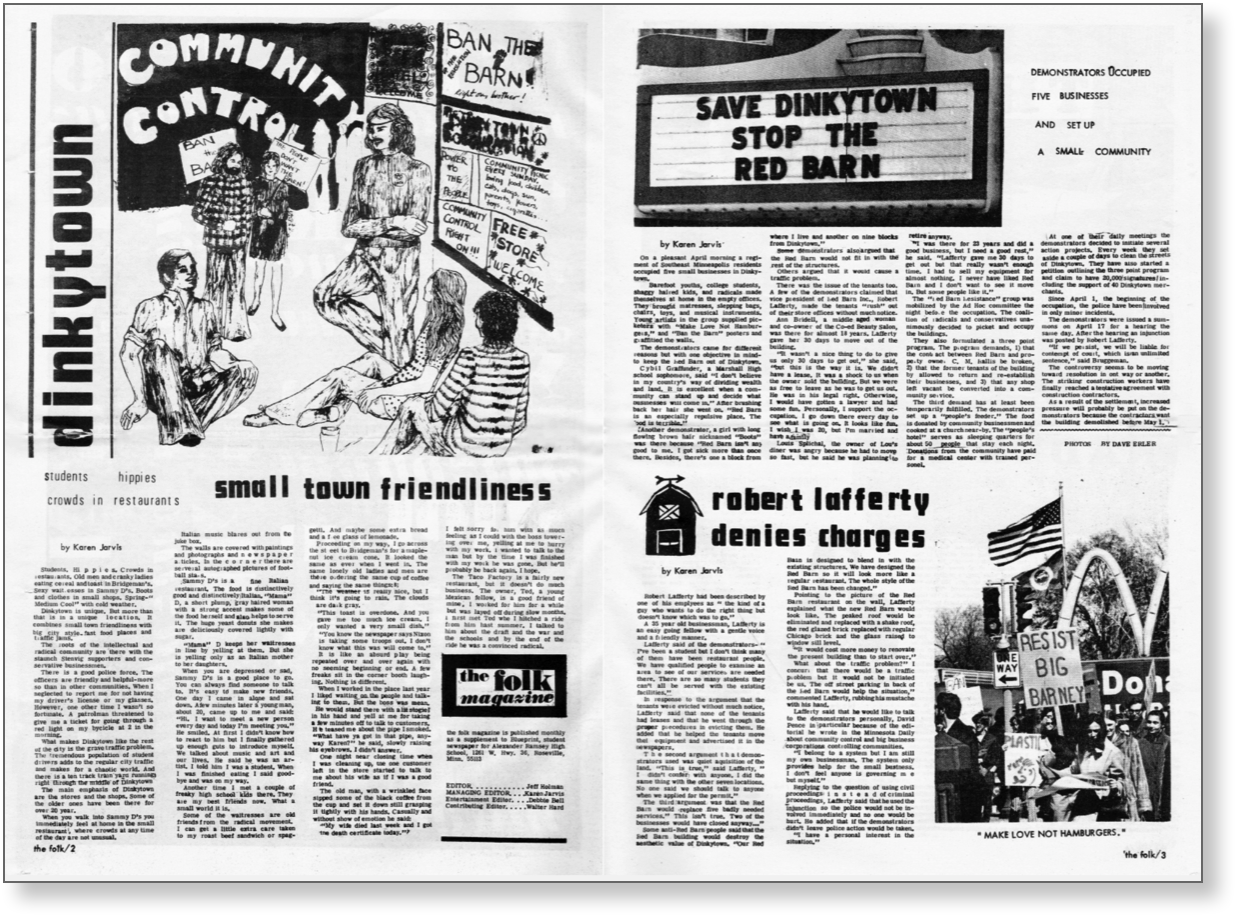April 1970
A magazine style supplement looks at life outside Ramsey
In April student editors published the first and only issue of The Folk, a magazine style supplement to the school newspaper. In the 60s newspapers typically included supplements — on Sunday morning the Minneapolis Tribune landed on doorsteps with “This Week” magazine and "Picture" magazine tucked inside.
Blueprint editors borrowed the idea and decided that “The Folk” would expand on regular coverage with more features on events and issues outside school, an art and literary section, and a more counter-cultural tone.
The issue featured a look at life in Dinkytown near the University of Minnesota campus, and the controversy surrounding neighborhood and student opposition to the building of a Red Barn fast food restaurant. Red Barn had bought a plot of Dinkytown real estate and promptly evicted a diner and a beauty salon that had been there for decades, giving them 30 days to move out. A petition with 20,000 signatures, picketing and a building occupation (the “Red Barn Resistance”) followed.
The magazine interviewed anti-Red Barn activists as well as company vice President Robert Lafferty. There was a Ramsey connection: David Pence, who had spoken and ignited controversy at Ramsey one month earlier, was one of the activists calling for “community control.” In addition, Dinkytown was only six miles and ten minutes from Ramsey High School, and many Ramsey students including Blueprint staffers would be attending the University of Minnesota in the fall.
The University’s Northrup auditorium was the site of an April speech by consumer activist Ralph Nader on the lack of government support for auto safety and the practices of General Motors. The magazine covered Nader’s talk. The issue also featured a interview with a Roseville police Sergeant on cars safety, teen drivers and violations that attract the attention of cops. “The main violation is defective equipment,” Sgt. Fox volunteered. “Kids seem to like to drive junkers.” The defective equipment? “Most often it’s the muffler,” the officer continued. “That’s the big one. Kids like noise.”
Blueprint editors borrowed the idea and decided that “The Folk” would expand on regular coverage with more features on events and issues outside school, an art and literary section, and a more counter-cultural tone.
The issue featured a look at life in Dinkytown near the University of Minnesota campus, and the controversy surrounding neighborhood and student opposition to the building of a Red Barn fast food restaurant. Red Barn had bought a plot of Dinkytown real estate and promptly evicted a diner and a beauty salon that had been there for decades, giving them 30 days to move out. A petition with 20,000 signatures, picketing and a building occupation (the “Red Barn Resistance”) followed.
The magazine interviewed anti-Red Barn activists as well as company vice President Robert Lafferty. There was a Ramsey connection: David Pence, who had spoken and ignited controversy at Ramsey one month earlier, was one of the activists calling for “community control.” In addition, Dinkytown was only six miles and ten minutes from Ramsey High School, and many Ramsey students including Blueprint staffers would be attending the University of Minnesota in the fall.
The University’s Northrup auditorium was the site of an April speech by consumer activist Ralph Nader on the lack of government support for auto safety and the practices of General Motors. The magazine covered Nader’s talk. The issue also featured a interview with a Roseville police Sergeant on cars safety, teen drivers and violations that attract the attention of cops. “The main violation is defective equipment,” Sgt. Fox volunteered. “Kids seem to like to drive junkers.” The defective equipment? “Most often it’s the muffler,” the officer continued. “That’s the big one. Kids like noise.”
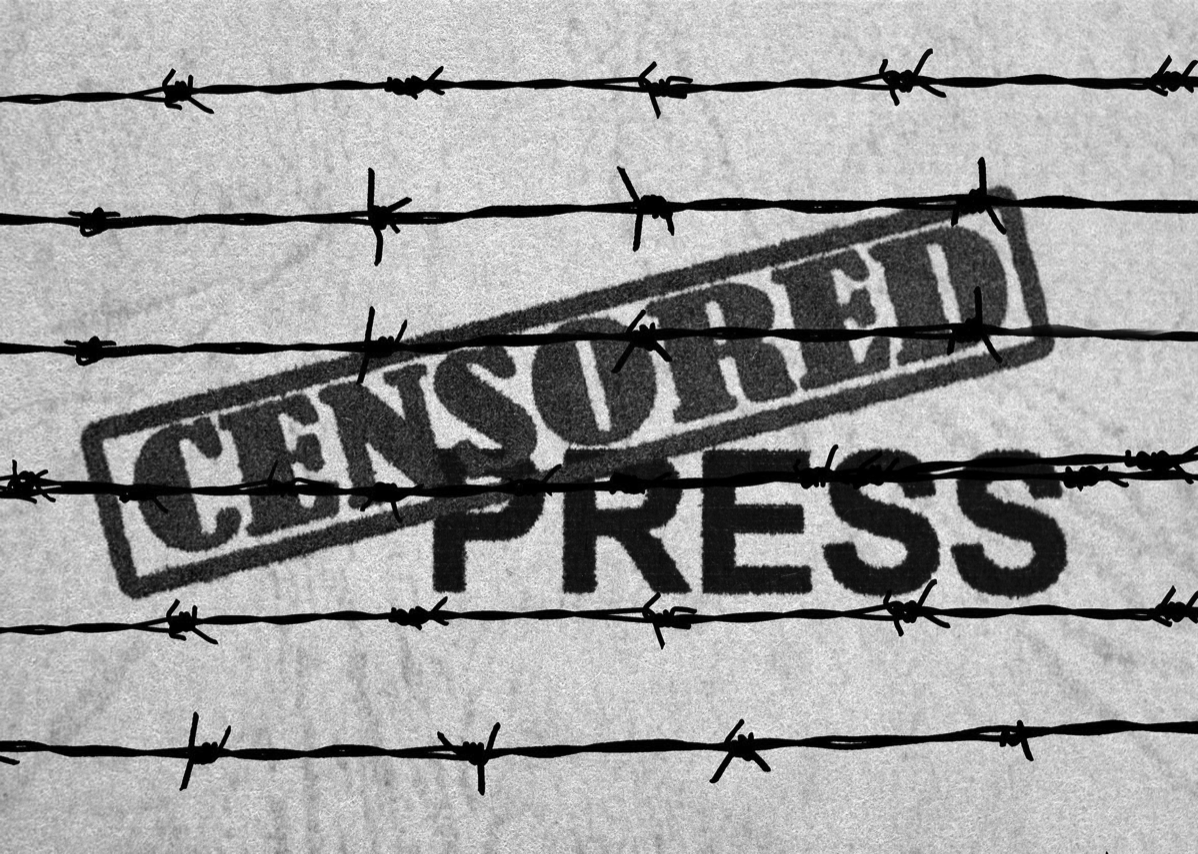
Ramsey editors could oppose school policies without facing censorship -- there was no need for an underground paper. At other Twin Cities high schools, administrators were not so liberal. The Edina Buzzette, the St. Paul Johnson High School Courier, the Stillwater Pony Express and the Golden Valley Viewer all faced administration pressure our outright censorship. An editorial in Golden Valley's student paper had criticized the presence of Golden Valley police at high school football games and referred to them as “notoriously unjust” and prejudiced. “The principal almost confiscated that issue before it could be distributed,” noted student editor Paul Flum.
“They had my mother in there, and it was almost like the FBI.”
A two-page Art and Literary section rounded out the issue featuring poetry by Ramsey sophomore Lorna Clymer. Clymer went on to be an English professor at California State University-Bakersfield and the author of several books on British literature. Her poems as a teenager still resonate with clarity and beauty.
There was no May issue of this publishing experiment. The year was winding down and graduation was looming. There was no time for another supplement on life outside Ramsey High School and in a way it seemed unnecessary — in a few weeks, that would be our reality.
In this issue
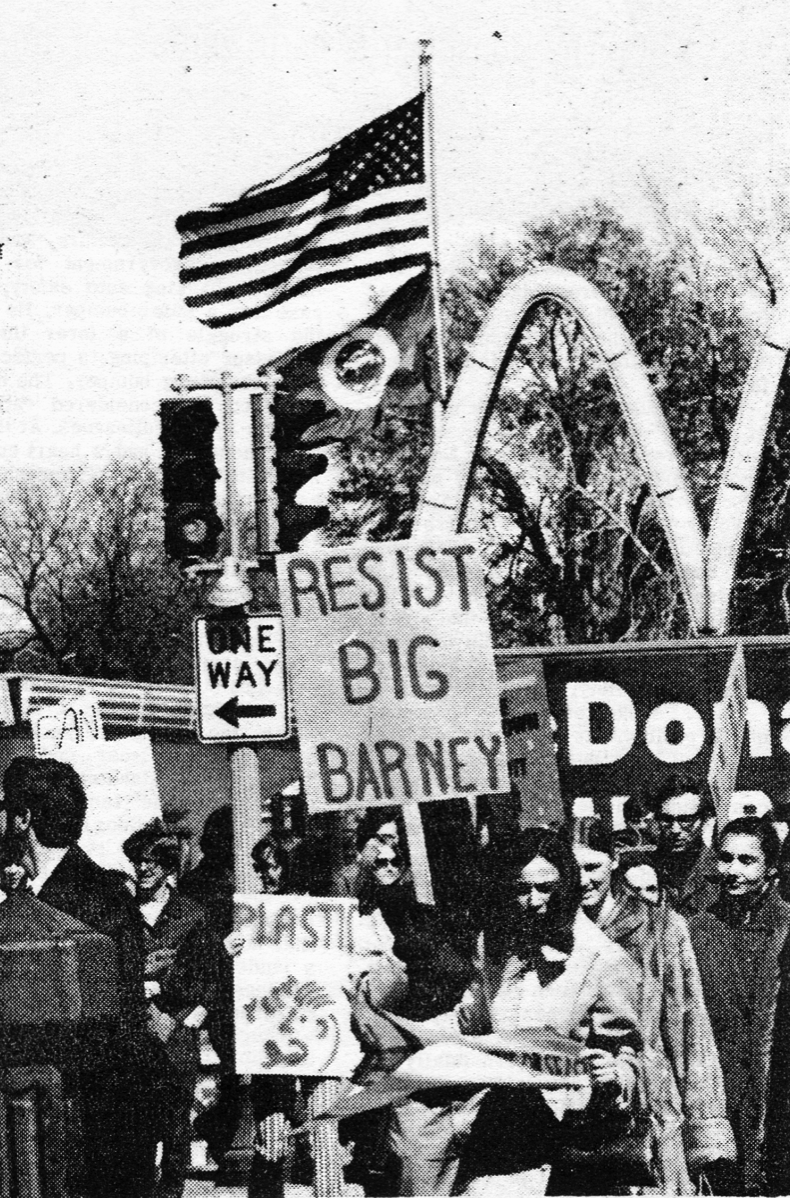
A neighborhood protest against fast food restaurant Red Barn's plan to build in Dinkytown
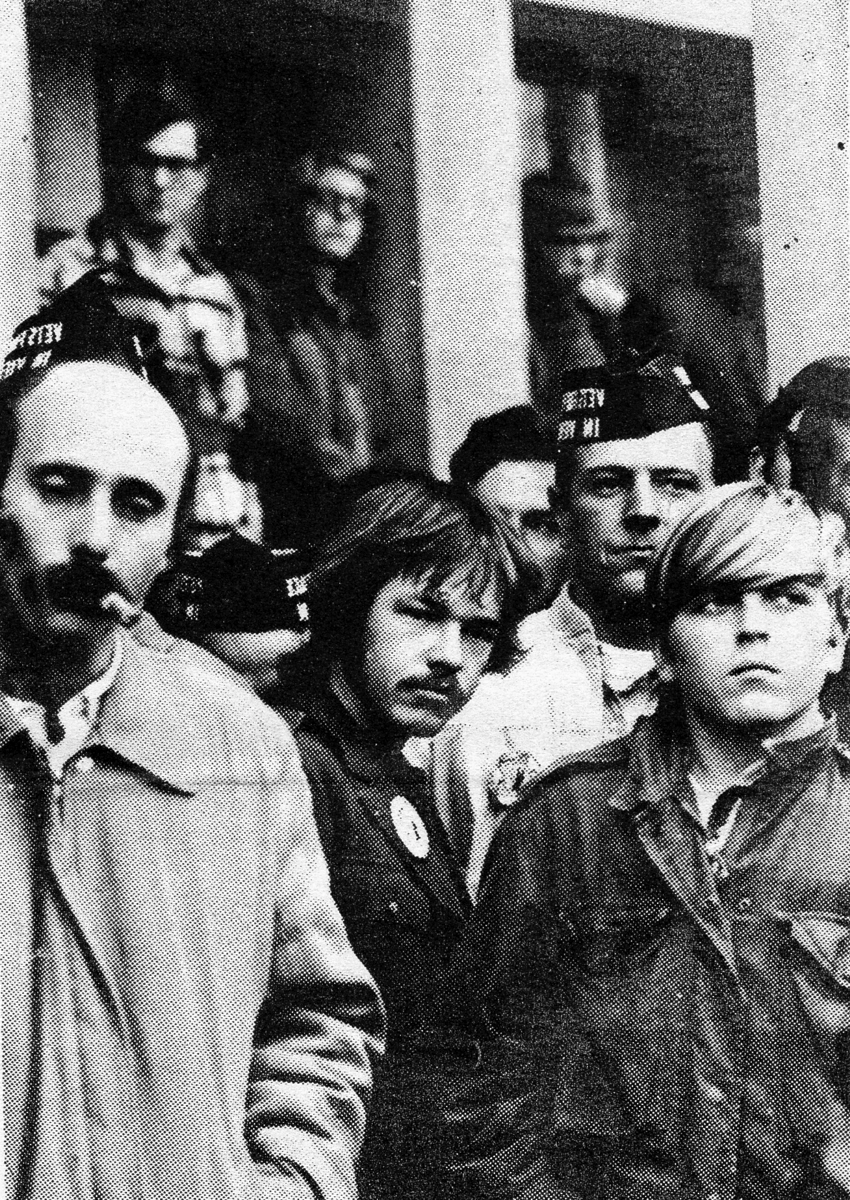
Antiwar demonstrators in a photo essay by David Erler
| the folk magazine (cover - Blueprint supplement publication) | 1 |
| Dinkytown: Students, hippies, crowds in restaurants | 2 |
| Save Dinkytown: Stop the Red Barn | 3 |
| Robert Lafferty denies charges | 3 |
| Nader blasts GM | 4 |
| Police on the prowl: What do the cops check? | 5 |
| Behind the wheel instruction | 5 |
| Art and Literary Section: Poems | 6 |
| Art and Literary Section: Art | 6 |
| Art and Literary Section: Poems | 7 |
| Art and Literary Section: Art | 7 |
| Led Zeppelin brings it on home | 8 |
| CSN&Y Branches Out: Young adds new dimension | 9 |
| Underground: Expressions of Student Outrage from the High School Press (section title) | 10 |
| How old will you be in 1984? | 10 |
| Look out for commies | 10 |
| Obscenity like beauty | 10 |
| Overground: Interviews with editors of established high school papers (section title) | 11 |
| The press vs. the censor | 11 |
| Can't you feel the fears? (photo essay) | 12 |
In April 1970
- A U.S. postage stamp costs 6 cents.
- A gallon of gas costs 36 cents
- The AMC Gremlin, introduced in April, sells for $1879
- The average cost of a new house is $23,450.
- The Jackson 5, the Beatles, Norman Greenbaum, Edison Lighthouse and Simon and Garfunkel top the Billboard charts.
- Top grossing movies in April include Patton, Airport, MASH and They Shoot Horses, Don't They?
Quoteable Quote

The main violation is defective equipment. Kids seem to like to drive junkers.
—Roseville Police Department Sgt. Fox on a ride-along with a student editor

